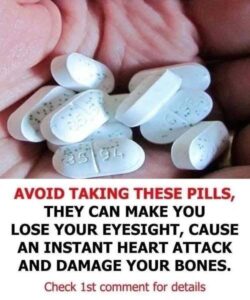Recent global health alerts have led to the withdrawal of certain medications from pharmacies due to serious cardiovascular risks.
Health authorities warn that some drugs—particularly hormonal contraceptives, anti-inflammatory medications, diet pills, and in rare cases, certain COVID-19 treatments—may increase the risk of dangerous conditions such as blood clots, strokes, and heart attacks.
Regulatory agencies, including the FDA and EMA, are urging both patients and healthcare providers to remain alert.

They emphasize the importance of reviewing medication safety updates and discussing any concerns with medical professionals before starting or continuing treatment.
One of the primary dangers linked to these medications is the formation of thrombi, or blood clots. Clotting is a natural process that prevents excessive bleeding after injury, but when it occurs abnormally inside a vein or artery, it can be life-threatening.
Blood clots can obstruct blood flow to essential organs, depriving them of oxygen and nutrients. Depending on where the blockage occurs, this can result in serious complications such as pulmonary embolism, deep vein thrombosis, strokes, or heart attacks.
Pulmonary embolism happens when a clot travels to the lungs, blocking blood supply. This can cause sudden shortness of breath, chest pain, and, in severe cases, death if not treated urgently.
Deep vein thrombosis involves clots forming in deep veins, usually in the legs, which can cause swelling, pain, and redness. If untreated, these clots can break free and lead to more severe conditions.
Strokes occur when a clot blocks blood flow to the brain, while heart attacks result from blocked coronary arteries. Both require immediate medical attention to prevent long-term damage or death.
Authorities stress that awareness and timely medical intervention are critical. Patients are advised to know the warning signs, seek help promptly, and consult their doctors about any medication risks.





